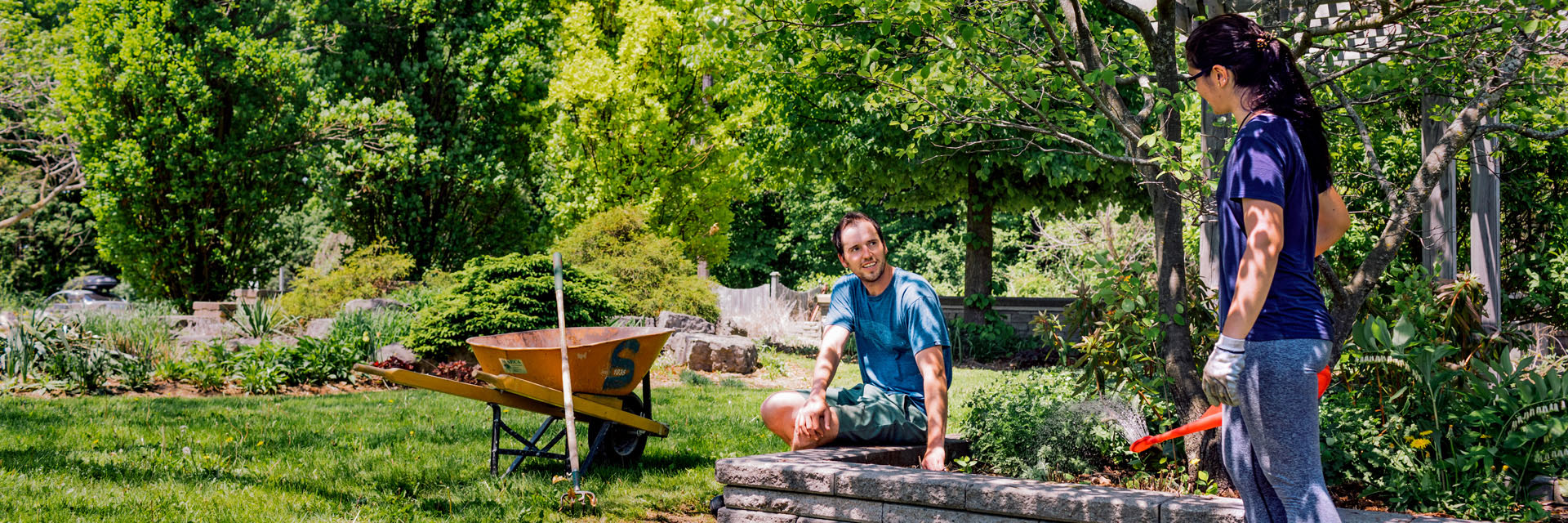Sustainability informs all aspects of Seneca’s daily operations. Seneca models and supports sustainable practices through collaborative relationships with students and employees, community members, industry representatives and service providers.
Operations








Our Goals
- update the Procurement Policy to embed sustainability
- create a greenhouse gas reduction plan
- increase the amount of locally/sustainably sourced food served on campus
- update and implement a waste reduction and minimization plan
- establish an integrated planning process for new and existing spaces and facility renewals
- grow the sustainable commuting program
Our Stories
Seneca Honey

Seneca has a sweet spot for honey thanks to a beekeeping initiative that includes 50 hives across three campuses. Seneca beehives produce upwards of 200 pounds of honey per hive, totalling 10,000 pounds of honey annually. The honey is bottled straight from the hives and sold on campus.
Seed Orchard
Seneca is one of five postsecondary institutions in Ontario selected by WWF-Canada to receive $5,000 for its new Seed Orchard project. Seeds harvested from hundreds of native plants are offered to Seneca students and employees to help create and restore wildlife habitats in their own neighbourhoods.
Waste Reduction
Seneca’s extensive and award-winning waste reduction program covers everything from e-waste and batteries to textiles, organics and other materials.
Sustainable Landscaping
Seneca has received close to $150,000 from the City of Toronto’s Greening Partnership Grant. Thanks in part to the funding, Seneca planted 205 new trees and 2,180 new shrubs at Newnham Campus in 2021 and will be supporting more sustainable landscaping work in 2022. The initiatives are part of a multi-year renovation to create a more sustainable and naturalized landscape.
Sustainable Buildings
Seneca’s award-winning Centre for Innovation, Technology & Entrepreneurship (CITE) at Newnham Campus has earned two gold-level Leadership in Energy and Environmental Design (LEED) certifications from the Canada Green Building Council, one for floors 1 to 3 (student space) and the other for floors 4 and 5 (office space).
Seneca’s Magna Hall at King Campus and Building A at Newnham Campus are also LEED Gold buildings.
Sustainable Commuting
Seneca’s campus shuttle provides free, safe, reliable and efficient transportation services to reduce the number of single-occupant vehicle trips between campuses.
Other transportation options and resources available at Seneca include Enterprise CarShare, the Seneca RideShare app, electric vehicle chargers and bike-fixing station and racks.
Sustainable Dining
Aramark, Seneca’s dining services operator, participates in a number of sustainable programs and initiatives. They include:
- Waste management protocols like sustainable packaging and minimizing food waste with the help of Leanpath
- Using local and sustainably sourced foods to help reduce greenhouse gas emissions and improve carbon footprint
- Offering plant-forward menu options to limit the amount of animal protein and reduce the impact on the environment
In addition, Aramark partners with Seneca’s urban farm to provide a selection of greens for its salad bar, whenever possible.
Geothermal Retrofit
As part of the Greenhouse Gas Campus Retrofits Program, Seneca received $4.7 million from the Government of Ontario’s Innovation Grant Fund for a geothermal retrofit at King Campus. The new heating and cooling system includes about 40,000 linear feet of piping installed 400 feet below the staff parking lot. It reduces greenhouse gas emissions at Garriock Hall by more than 50 per cent.
Salt Reduction

Seneca partnered with WWF on a pilot project to reduce the amount of road salt used on campus by 50 per cent.
By applying a saltwater solution and closing several unused walkways and pathways in the winter, we can protect the waterways and environment around campus. Currently, salt brine is only used when the surface temperature of an area is above -10°C.
Self-Driving Floor Cleaner
An applied research project at Seneca has turned an aging floor cleaner into a self-driving robotic prototype. This is a collaboration between Seneca Innovation, the School of Electronics & Mechanical Engineering Technology, Sustainable Seneca and Cyberworks Robotics, a company specializing in artificial intelligence self-driving technology.
